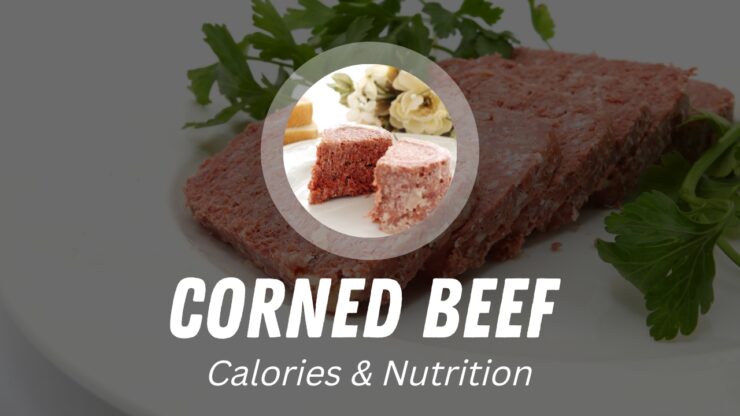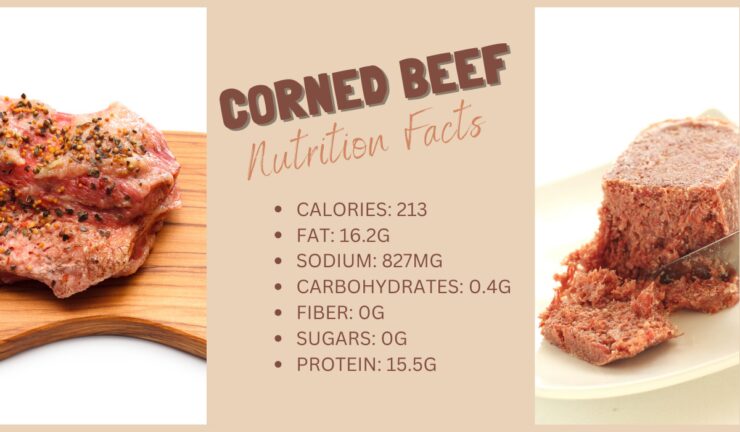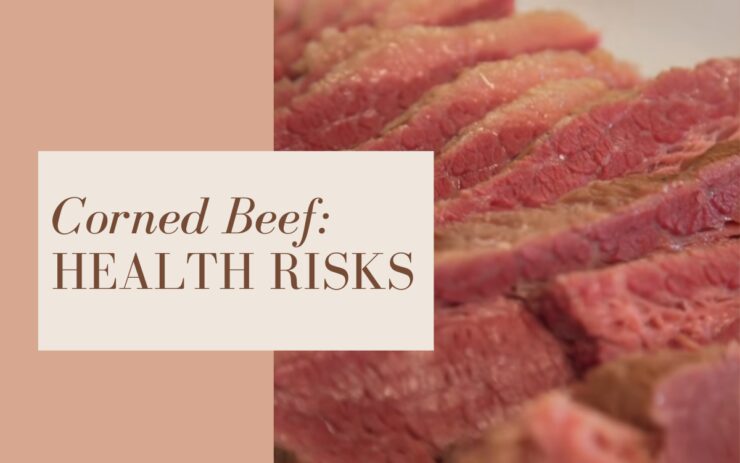Corned beef is a delicious cut of meat, pickled in seasoned salt, and contrary to its name, not a single ounce of corn is used to make it. It is a highly popular dish for St Patrick’s Day that is celebrated in America and Europe. But is corned beef healthy? After our research, we found some answers to this question we would like to share with you, so read on to find out more.
To start off, it is important to note that corned beef is not exactly the most nutritious cut of meat, and it is jam-packed with sodium. As such, it is a dish you want to consume once in a while rather than making it a regular part of your diet. In this article, we will discuss corned beef’s nutritive value and other aspects of the dish. So, let us start.

Contents
How Do You Make Corned Beef?
As we previously mentioned, corned beef is completely unrelated to corn. Before people had refrigerators, meat was dry-cured in large coarse pellets, otherwise called “corns” of salt, to preserve it, and it is how this dish got its name.
Nowadays, corned beef is made by using brine of saltwater rather than dry-curing with salt pellets. Corned beef brine also includes sugar, peppercorn, and bay leaf, alongside other spices that are added.
The most important step in making corned beef is the brining process that gives this dish its prominent and recognizable flavor. It is a process that makes the meat juicy and prevents it from getting overcooked.
Is Corned Beef Healthy?
Given the fact that corned beef is loaded with sodium, everyone who is at risk of heart disease, high blood pressure, and stroke, should eat it in moderation every once in a while. It is not the most nutritive or healthiest cut of meat, but it does come with some benefits we will talk about later on.
Nutritional Content of Corned Beef
Corned beef is a dish packed with protein and fat and is also a great source of minerals and vitamins. In the section below, we are going to break down the nutritional content of corned beef, and we will use a 3-ounce portion as an example.
Protein
Corned beef is a cut of red meat and is a very good source of protein. A single serving delivers 15 g of protein, which is a considerable chunk of the daily recommended intake. The protein in this dish stimulates muscle growth and gives you a great deal of energy.
Carbohydrates
This dish contains no carbs due to its lack of sugar content. However, you can find a scant amount of carbohydrates from sugar or flavorings such as peppercorns or mustard seeds that are added to this dish in the seasoning.
Carbs are still a very important component of diets since they provide a great deal of energy and can keep you strong for a longer time. So, if you are planning to eat corned beef, consider the lack of carbs and perhaps add some to the side of the dish.
Fat
Corned beef is mostly made from brisket, which has one of the highest fat content out of any piece of meat from a cow. Fats are indeed essential in any diet, but the issue is that about one-third of corned beef’s fat is harmful saturated fat.
Therefore, eating excessive amounts of corned beef may be harmful to people that are at risk of high blood pressure and heart attack. Even if you are not at this type of risk, it is essential to consume it in moderation.
Sodium
A single serving of corned beef delivers 827 milligrams of sodium which is a very high amount. Although your body needs sodium, this amount can be quite unhealthy, especially if you eat corned beef often.
High amounts of sodium can raise your blood pressure and put you at risk of stroke, so if you are a prior heart patient or have hypertension, it is best to avoid corned beef altogether.
Vitamins
Corned beef mostly contains vitamin B, but it is also a great source of vitamin B12. These vitamins aid you with red blood cells in your body and ensure that oxygen transportation remains smooth and functional.
The downside is that this dish does not have a high content of other vitamins. However, you can work around this and simply add some vegetables that will increase vitamin intake and make a more balanced meal.
Minerals
As far as minerals go, corned beef possesses plenty. A single serving contains a good deal of iron (1.86 grams) and zinc (roughly 2 grams). These minerals aid you in keeping your body in shape since they facilitate oxygen transfer and promote your nervous system’s health.
Red meat also delivers a great deal of selenium, which is an excellent antioxidant and aids in the prevention of cancer. Antioxidants such as this help you protect the cells in your body from damage.
Health Risks of Eating Corned Beef
As we mentioned before, one of the major concerns when it comes to corned beef is its high amount of sodium content. This is particularly important information for people that have high blood pressure.
Consuming more than 5.000 milligrams of sodium daily is linked with an increased risk of a heart attack in people who already have high blood pressure. Doctors and nutrition experts recommend no more than 2.300 milligrams of sodium per day and around 1.500 for people with high blood pressure.
Given the fact that a 3-ounce serving of this dish delivers 827 milligrams of sodium, you can see why it is a bad idea to consume it more than every once in a while. Occasional corn beef should not be a problem, especially if your diet consists of mostly whole foods.
Final Words
Although corned beef is a portion of delicious food, consuming it in moderation is strongly advised. You should always keep in mind that this dish is jam-packed with sodium, sodium nitrate, and saturated fats, which can all be harmful to your health.
Of course, if your corned beef recipe has added ingredients with extra vitamins, minerals, and nutrients, you might consume it more frequently. For example, potatoes can be a very good addition, given the fact that corned beef does not contain carbs.
Essentially, this dish can be bad for you if you consume it on a regular basis or if you cook this food with less nutritious ingredients. If you have heart health issues, always measure the nutritional value and keep your diet balanced.

Steve is a certified trainer with more than 10 years of training experience and he holds a Master’s in Sports Science. Prior to Boston Rock Gym, Steve worked for two years as a personal trainer.




